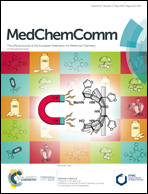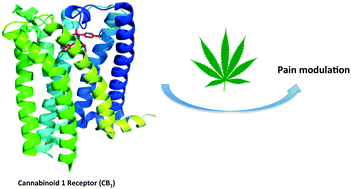
“The mainstay treatment for schizophrenia is antipsychotic drugs (APDs), which are mostly effective against the positive symptoms (e.g. hallucinations), but provide minimal benefits for the negative symptoms (e.g. social withdrawal) and cognitive deficits.
We have recently shown that treatment with the non-intoxicating phytocannabinoid, cannabidiol (CBD), can improve cognition and social interaction deficits in a maternal immune activation (MIA) model relevant to the aetiology of schizophrenia, however, the mechanisms underlying this effect are unknown.
An imbalance in the main excitatory (glutamate) and inhibitory (GABA) neurotransmitter systems in the brain plays a role in the pathophysiology of schizophrenia. Therefore, the endocannabinoid system could represent a therapeutic target for schizophrenia as a regulator of glutamate and GABA release via the CB1 receptor (CB1R).
Overall, these findings show that CBD can restore cannabinoid/GABAergic signalling deficits in regions of the brain implicated in schizophrenia pathophysiology following maternal poly I:C exposure. These findings provide novel evidence for the potential mechanisms underlying the therapeutic effects of CBD treatment in the poly I:C model.”
https://www.ncbi.nlm.nih.gov/pubmed/31202911
https://www.sciencedirect.com/science/article/pii/S027858461930106X?via%3Dihub


 “The endocannabinoid system is an endogenous pathway comprised of the cannabinoid receptors 1 and 2 (CB1 and CB2), their endogenous ligands known as endocannabinoids, and the enzymes responsible for their synthesis and degradation. The endocannabinoidome extends this system to include other receptors such as TRPV1, PPARα, GPR55 and 5-HT1A. An extensive amount of research is now linking the endocannabinoidome to intestinal health through fascinating mechanisms that include endocannabinoid receptor expression in the gut and interplay with the intestinal microbiota. A dysregulated endocannabinoid system may lead to inflammatory bowel disease and colon cancer.”
“The endocannabinoid system is an endogenous pathway comprised of the cannabinoid receptors 1 and 2 (CB1 and CB2), their endogenous ligands known as endocannabinoids, and the enzymes responsible for their synthesis and degradation. The endocannabinoidome extends this system to include other receptors such as TRPV1, PPARα, GPR55 and 5-HT1A. An extensive amount of research is now linking the endocannabinoidome to intestinal health through fascinating mechanisms that include endocannabinoid receptor expression in the gut and interplay with the intestinal microbiota. A dysregulated endocannabinoid system may lead to inflammatory bowel disease and colon cancer.”





 “Age-related cognitive decline has been associated with proinflammatory cytokines, yet the precise relationship between cognitive decline and cytokine load remains to be elucidated. β-caryophyllene (BCP) is a cannabinoid receptor 2 (CB2) agonist with established anti-inflammatory effects that is known to improve memory and increase lifespan. It is of interest to explore the potential of BCP to reduce age-related cognitive decline and proinflammatory cytokine load. In this study, we assessed changes in circulating cytokines across the lifespan, memory performance in young and aged mice, and the effects of BCP on memory function and cytokine load. The plasma levels of 12 cytokines were assessed in male Swiss-Webster mice at 3, 12, and 18 months of age using multiplexed flow cytometry. Working memory was compared in 3 and 12 month-old mice using spontaneous alternations. A dose-response function (100-300 mg/kg, subchronic administration) for BCP-induced memory restoration was determined in 3 and 12 month-old mice. Finally, the effects on cytokine levels of the peak memory enhancing dose of BCP was assessed in 18 month-old mice. Circulating levels of several cytokines significantly increased with age. Multilinear regression analysis showed that IL-23 levels were most strongly associated with age. Aged mice showed deficits in working memory and higher levels of IL-23, both of which were reversed by BCP treatment. BCP appears to reverse age-associated impairments in memory and modulates cytokine production. IL-23 may play a significant role in the aging process, and future research should determine whether it has utility as a biomarker for novel anti-aging therapeutics.”
“Age-related cognitive decline has been associated with proinflammatory cytokines, yet the precise relationship between cognitive decline and cytokine load remains to be elucidated. β-caryophyllene (BCP) is a cannabinoid receptor 2 (CB2) agonist with established anti-inflammatory effects that is known to improve memory and increase lifespan. It is of interest to explore the potential of BCP to reduce age-related cognitive decline and proinflammatory cytokine load. In this study, we assessed changes in circulating cytokines across the lifespan, memory performance in young and aged mice, and the effects of BCP on memory function and cytokine load. The plasma levels of 12 cytokines were assessed in male Swiss-Webster mice at 3, 12, and 18 months of age using multiplexed flow cytometry. Working memory was compared in 3 and 12 month-old mice using spontaneous alternations. A dose-response function (100-300 mg/kg, subchronic administration) for BCP-induced memory restoration was determined in 3 and 12 month-old mice. Finally, the effects on cytokine levels of the peak memory enhancing dose of BCP was assessed in 18 month-old mice. Circulating levels of several cytokines significantly increased with age. Multilinear regression analysis showed that IL-23 levels were most strongly associated with age. Aged mice showed deficits in working memory and higher levels of IL-23, both of which were reversed by BCP treatment. BCP appears to reverse age-associated impairments in memory and modulates cytokine production. IL-23 may play a significant role in the aging process, and future research should determine whether it has utility as a biomarker for novel anti-aging therapeutics.”